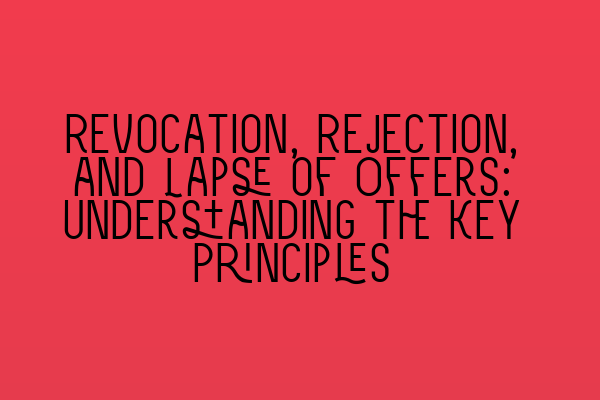Revocation, Rejection, and Lapse of Offers: Understanding the Key Principles
In the world of contract law, understanding the principles surrounding revocation, rejection, and lapse of offers is essential. These principles dictate how offers are made, accepted, and terminated, and can have significant implications for both parties involved. In this comprehensive guide, we will delve into the key principles of revocation, rejection, and lapse of offers, providing you with a solid foundation to navigate the complexities of contract law.
But before we dive into the specifics, let’s first clarify what an offer is in the context of contract law. An offer is a proposal made by one party (the offeror) to another party (the offeree) with the intention to create a legally binding agreement. It is important to note that an offer is distinct from an invitation to treat, which is a preliminary step that allows parties to negotiate and make offers.
Now, let’s explore the key principles governing revocation, rejection, and lapse of offers:
1. Revocation of Offers:
Revocation refers to the act of withdrawing an offer before it has been accepted. The general rule is that an offer can be revoked at any time before it has been accepted, even if the offeror has promised to keep it open for a specific period. However, certain conditions must be met for a revocation to be valid. Firstly, the offeror must communicate the revocation to the offeree directly or through a reliable source. Secondly, if the offeree has already dispatched their acceptance, the revocation will not be effective until it is communicated to the offeree.
It is important to note that there are some exceptions to the revocation rule. For example, if the offeree has provided consideration in exchange for keeping the offer open for a specified period (known as an option contract), the offeror is bound by their promise and cannot revoke the offer during that time.
2. Rejection of Offers:
Rejection occurs when the offeree explicitly refuses to accept an offer. Once an offer has been rejected, it becomes null and void. The rejection can be communicated verbally, in writing, or through conduct that is inconsistent with an intention to accept the offer. It is important to communicate rejections promptly to avoid any confusion or potential misunderstandings.
However, it is worth noting that a rejection does not automatically terminate an offer. If the offeree later has a change of heart and decides to accept the offer after rejecting it, they must communicate their acceptance to the offeror. Unless the offeror has already revoked the offer or a reasonable period has elapsed, the acceptance will still be valid.
3. Lapse of Offers:
An offer can also lapse if certain conditions are met. Firstly, an offer will cease to exist if a specific deadline for acceptance has elapsed without the offeree accepting it. The offeror is no longer bound by the offer, and the offeree cannot revive the offer by accepting it after the deadline.
Secondly, an offer can lapse if it is conditional and the condition specified by the offeror is not fulfilled within a reasonable time. The offeror is not obligated to keep the offer open indefinitely, and if the condition is not fulfilled within a reasonable period, the offer will become invalid.
Finally, an offer can lapse if either of the parties involved dies or becomes mentally incapacitated before the offer is accepted. In such cases, the offer becomes void, as it is no longer possible for the parties to enter into a legally binding agreement.
Understanding the principles of revocation, rejection, and lapse of offers is vital when navigating the complexities of contract law. By having a solid grasp of these principles, solicitors can effectively advise clients, draft contracts, and negotiate agreements.
If you found this article helpful, you may be interested in exploring similar topics related to contract law. Check out these related articles for further insights:
– Navigating Legal Challenges and Pitfalls in Your Practice
– Ethical Responsibilities of Solicitors: Upholding Professionalism
